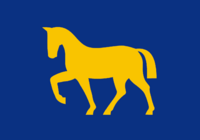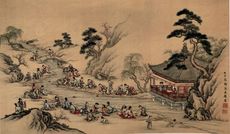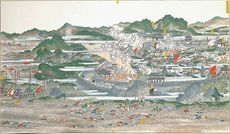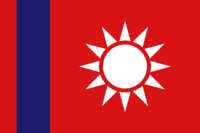Maguan
Maguan 马关州 Mǎguān zhōu | |
|---|---|
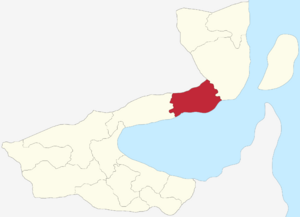 Map of Monsilva with Maguan highlighted | |
| Country | |
| State status | 3 June 1983 |
| Capital | Maojie (贸接) |
| Government | |
| • Body | Maguan State Government |
| • Premier | Zhang Guanyu (FDP) |
| • Deputy Premier | Gao Cheng (FDP) |
| Population (July 2022) | |
| • Total | 4,143,290 |
| Time zone | AMT+13 (Monsilvan Eastern Time, MET) |
| ISO 3166 code | MS-MAG |
| GRP (¥) | ¥807 billion |
| Major airports | Maojie City Airport (MCA) Xinbin Taoyuan International Airport (XTA) |
| Transit System(s) | MRA Maojie Metro |
| Police[1] | Maguan State Police |
| Ambulance[2] | Maguan State Ambulance |
| Fire[3] | Maguan Fire Service |
Maguan (Monsilvan: 马关州; Pinyin: Mǎguān zhōu), is a state of the Monsilvan Republic. The state has around 4.1 million people, with 84% of them living in the state's capital, Maojie. It is located in northern Monsilva, along the Xiaoguan stretch, sitting north of Xiaogu and south of Meixian and the nation of Akvarelusus. Maguan has a warm climate, especially near the coast, and weather is often humid and rainy in the late summer, whilst being dry and cool during the winter and early spring. The state of Maguan is governed by the Maguan State Government, with Zhang Guanyu of the FDP being the current premier. The state is divided into 6 districts, 21 counties, 32 legislative constituencies and 90 municipalities and is equally represented by 6 Senators in the Senate and 32 members in the Legislative Assembly. The Maguan State Parliament consists of 90 seats, and is currently lead by the FDP, with the Reformed National Party leading the opposition.
Maguan is Monsilva's fifth most populous state, and has the fourth highest urbanization of all the states. In terms of industry, rural Maguan produces significant amounts of animal-based products such as meat, leather and wool. However, most of Maguan's industry takes place in the cities. Maojie has a large range of industries, from technology to medical to logistics. Xinbin is Maguan's only city other than the capital and has a population of just over 430k people. Xinbin is located east along the coast. The two cities are quite close to each other, and are clearly visible when in tall buildings or on piers out onto the Bay of Monsilva. Maguan has a nominal GRP of around ₵134 billion, giving it a GRP per capita of ₵32,296.
Maguan is served by the Monsilvan Railways Administration which connects the state to the rest of Monsilva. Maojie has the Maojie Metro which serves all of greater Maojie, but also connects to towns not far from the border of the city. Maguan has two international airport: Maojie City Airport and Xinbin Taoyuan International Airport. The Monsilvan high-speed rail service serves Maojie Main Station and has high-speed platforms under construction at Xinbin station. The high-speed runs to cities such as Amking, Waiping, Menchi and Luhai.
Contents
Toponymy
The name, Maguan comes directly from the HY Pinyin of the Monsilvan "馬關". The character "馬" means "horse" in Monsilvan, and the character "關" means "barrier". Therefore, Maguan directly translates to "horse barrier", which is speculated to refer literally to a barrier meant to keep horses from either getting in, or escaping. This is likely, as Maguan used to have a much larger native horse population, although this has massively decreased over hundreds of years.
History
Prehistory and early dynasties
Maguan was an important agricultural region during the early history of Monsilva. Inhabited for thousands of years, Maguan also had lots of people living in the region, more so than places like Amking and Luhai today. Until the Qin invasion in 650 CE, Maguan was the principal region of the Tang dynasty and its preceding dynasties. Maojie was the capital of all four dynasties that occupied the area, making it the oldest city in Monsilva, at over 2800 years old.
After the Qin invasion, Maguan came under the juristiction of the Greater Qin dynasty. Under the Qin, Maguan lost its role as principal region and Maojie was no longer a capital. This shrunk Maguan's population, as many people went north to Luhai, or escaped during the invasion across the bay towards the Shang dynasty. However, Maguan then gradually became a more agricultural region, with many small towns forming in the north of the region farming cattle, chicken and pigs.
Zhou dynasty and the Empire of Baltanla
When the Unification of the Monsilvan Kingdoms took place in 1201, the Qin dynasty was disbanded and replaced with the Zhou dynasty, which ruled over all of modern-day Monsilva. Maguan became a common outpost for land travellers who were coming from Amking and other cities in the south to Luhai. This caused Maguan to develop a sizeable population of people. Maguan retained its agricultural industry and its population gradually grew throughout the 13th to 15th centuries.
Unlike most of Monsilva, Maguan was not particularly effected by the Zhou dynasty's economic turmoil in the 16th century as it was a very self-sustainable region. However, it did not provide enough resources for the rest of the country, which suffered terribly. When the Zhou dynasty voluntarily ceded itself to the Empire of Baltanla in 1568, Maguan was the only region displeased by this decision as the people were worried their industry would dissipate due to the massive agricultural industry already existing in Baltanla.
Although this worry came true for Maguan, it did not come without its benefits. Maguan's agricultural industry shrunk quite substantially over the 16th century, however the industry was being replaced with more advanced industries such as textiles and ceramics. These industries were mainly focused on Maojie and Xinbin, which is what lead to their significant growth during this period.
Kingdom of Great Shan and the Civil War
When Monsilva left the empire in 1730, Maguan had developed from an agricultural region to an industrial region, producing many different exotic and expensive products that were a prize for many merchants from across the continent and even from Ecros. During the Kingdom of Great Shan, Maguan regained some of its agricultural industry however, as merchants began focusing on Luhai and Amking rather than Maojie.
When the Monsilvan Civil War arrived in 1824, Maguan was the first region to be fought for between the Imperial Army and the Liberate Monsilva Movement. Xinbin was the first city to be captured by the LMM during the war. During the battle for Maguan from 1824 to 1825, Maguan suffered massively. Fires, famine and death covered the region as both sides of the civil war battled for control. By the end of 1825, the war had moved south to southern Xiaogu. After the fighting left Maguan, it was in a terrible state, and a large portion of Maojie was burnt to the ground.
Kingdom of Monsilva and the Republic
After the civil war, with the beginning of the Kingdom of Monsilva, Maguan was in need of significant repairs. Fortunately, it was one of the most focused on regions in the country after the war due to its cultural importance to the nation. By the end of the 1860s, Maojie had been fully rebuilt and was beginning to surpass its pre-war population. In the early 20th century, Maguan returned to being a semi-agricultural region, producing bread, meat, fish as well as textiles, ceramics and later metal and concrete.
During Martial law in Monsilva, Maguan was relatively unaffected until the early 1970s, when protests began to occassionally erupt in Maojie or Xinbin. This lead to increased police presence which also increased the amount of brutality against non-Monsilvans as well as people who broke the strict laws. In 1978, Maojie and Xinbin were some of the many cities which took part in the 1978 Monsilvan protests during the Monsilvan Revolution, which lead to the eventual dissolution of the Kingdom of Monsilva government and the establishment of the Republic by the Monsilvan Revolutionary Army.
Maguan had been a region during both the Kingdom of Monsilva and Great Shan, so when the Monsilvan Republic was established in 1978, Maguan immediately became a state, although devolved powers did not come to any states until later. When Maguan was given devolved power in 1983, the Maguan State Government was established, succeeding the Maguan Advisory Council. The Maguan State Government has been governed by the FDP since its establishment.
Administration
Local government
The state of Maguan is governed by the Maguan State Government, based in the Maguan State Office in Maojie. The state parliament is a unicameral legislature consisting of a 90-seat State Parliament. Each municipality in Maguan is represented by one State Parliament Member. Members are elected for four-year terms. The Parliament meets every week, with the day depending on the first weekday after the state election which takes place in different states at different times. The leading party in the State Parliament determines who will be the Premier. Zhang Guanyu of the FDP has been the Premier of Maguan since 2014.
National government
Maguan is represented in the Parliament of Monsilva by 6 Senators in the Senate of Monsilva and 32 Members of the Legislative Assembly.
Geography
Maguan's terrain varies from north to south, with the north being predominantly hilly and forested, whilst near the coast in the south, the terrain is flat and urban. Maguan is quite a compact state, with settlements being consistently scattered all across the state, seperated only by farms. However, the hilly forested areas near the Akvarelian border are home to a few national parks and protected areas of nature.
Maojie is home to one of Monsilva's few urban national parks. Linjiang National Park is in western Maojie and is home to tunnels of mangrove trees as well as the Linjiang sandbar, which is an odd formation of sand on the coast.
Maguan is one of Monsilva's 9 states with external EEWSs. Earthquakes are occasional in Maguan, and can range from minor tremors to serious earthquakes such as the 2011 Maojie earthquake, which was a 7.3 ML earthquake that resulted in 1,800 deaths and around 10,000 injuries as well as ₵150 million in damages. Which is the most deaths from a natural disaster in modern Monsilvan history.
Climate
Maguan is a very warm state almost all year round, although the humidity drastically changes throughout the year. The winter and early spring are predominantly dry and cool, with temperatures sitting between 15-20 degrees celcius, whilst the summer can get very hot and very wet. The last typhoon in Maguan was the 2017 Monsilvan typhoon, which resulted in no deaths or serious injuries, but caused around M¥1,206,000 in damages.
Demography
| Country of Birth | Population | Percent | |
|---|---|---|---|
| 4,018,991 | 97.0 | ||
| Non-Monsilvan | 124,299 | 3.0 | |
| 49,719 | 1.2 | ||
| 20,716 | 0.5 | ||
| Others | 53,863 | 1.3 | |
| Total | 4,143,290 | 100.0 | |
The 2022 census recorded that 124,299 people or 3.0% of Maguan's population were of non-Monsilvan descent. The table to the right shows the most common countries of origin of Maguan residents. Maguan is a very urban state, which is likely why it has such a large number of migrants. 94% of Maguan's population live in cities, being either Maojie or Xinbin, which is also where the vast majority of Maguan's non-Monsilvan population lives. The other 248,597 people living outside of the cities are predominantly Monsilvan and live in towns scattered across Maguan's northern half.
Religion
Maguan has a majority Monsilvan folk religion population, whilist Buddhism comes in second. Around 53.5% of Maguan's population follow the Monsilvan folk religion to some extent. This is likely due to the deep historical connection between the people of Maguan and Confucianism, as Confucius was said to be born in Maojie, and Maguan is home to many Confucian temples which families have been visiting regularly for hundreds of years.
Following Monsilvan folk religion in the census was Buddhism at 30.6% of the population; then it was the 'Unaffiliated' category (people who do not follow any organized religion, including atheism and agnosticism) at 15.4%; and finally 'Other' (which includes Christianity and Islam) took up the last 0.5%.
Transport
Maguan's transport is administered by the state's Department for Transport, which is a sub-department of the federal Department of Transport. Maguan is one of Monsilva's most accessible states by rail transport, with over a hundred railway stations that are served by the MRA, as well as having the extensive Maojie Metro. In terms of public road transport, bus and coach services run across the state, and connect to other locations around the country.
In October 2022, the Maguan State Government suggested re-organizing the Maojie Metro into a state-wide railway network that would give easy access for towns in the northern region of Maguan as well as connecting Xinbin and Maguan together. The aim of this suggestion was to reduce the population growth of Maojie and instead encourage the population to spread out across the state as the city was getting overcrowded. In January 2023, the motion to re-organize was passed by the Maguan State Parliament by 59 of the 90 members, but on a smaller scale than the original suggestion.
Education
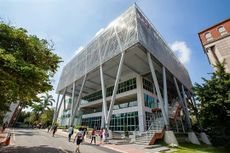
Education is mandatory until the age of 18 for children living in Maguan, which is two years above the minimum age at the federal level (16). Maguan's towns and cities feature many schools, from elementary to high school. As well as this, Maguan is home to many higher education institutes including:
The University of Maojie (UMJ) is a highly regarded medical university and has alumni which have ended up in major scientific positions. The current premier of Maguan, Zhang Guanyu has a doctorate of medical biology from UMJ. UMJ is often considered Monsilva's best medical university, ranked first alongside Nanguan Medical University in Amking.
Xinbin University (XBU) is a well regarded university that specialises in humanities such as social sciences, foreign languages and theater. It is also Monsilva's only university with a acting school alongside, which if entered below the age of 18, automatically grants you a place in a theatrical course at the university.
Culture
Tourism
Maguan is a well known cultural destination for tourists, housing many historical sites which can be over 2000 years old. Famous tourist destinations in Maguan include Linjiang National Park, Hualin Forest National Park, Dagonghu Palace, Maojie Institute of Science and Technology and Qifang Sanxiang District.
Qifang Sanxiang is one of the most popular tourist destinations thanks to its uniqueness. Most parts of the district is around 400 years old and is considered an architectural museum and "portal through time" to the Empire of Baltanla and Great Shan era of Monsilvan history. However, some sections are over 700 years old, and are being maintained efficiently to preserve their history. Most of the original 700 year old district was lost after the 2011 earthquake.
Sport
Football and yuchio are popular sports in Maguan. Football is the most popular by far and is a major part of modern Maguan culture. The largest professional teams in Maguan are Maojie F.C. and Xinbin City F.C., both of which are in the Monsilvan Super League. The rivalry between the two teams is strong, and matches between the two are extremely well attended and have occasionally ended in heated exchanges.
Yuchio is played often in Maguan, and there are many yuchio courts across the state, particularly in rural parts of Maguan. One of Monsilva's best yuchio players, Dewei Ch'eng, was born in Sanzhi, a town in northern Maguan.
